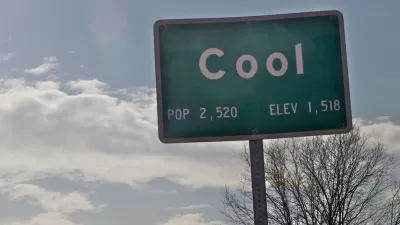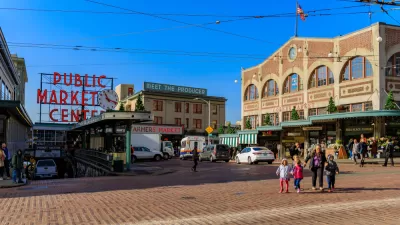Planetizen blogger and professional planner Steven Snell pens another dispatch for Fast Forward Weekly. This time he explains the "Slow" ethos—slow food, slow homes, and, yes, slow cities.

"Lesser known than slow food is Cittaslow (slow cities)," writes Snell. "Slow cities’ ethos is to resist the homogenizing effects of economic forces in cities, and how those forces often result in buildings that are reproductions of themselves — having no geographic origin; homes, tower blocks, shopping centres look like or function just like any other from any other place. Simply, or perhaps simplistically, Cittaslow is about a little less driving, a little less consumerism, a little more street fares, a little more drifting aimlessly in our urban milieu. Membership, if one is inclined towards a badge or byline, however, is available to those towns of souls totalling less than 50,000."
Snell also explains that the concept of slow is closely related to that elusive but coveted concept of "authentic," which is so central to high quality urban experiences. "Slow whatever-have-you is ultimately about community and engaging in authentic experiences. Authentic might just be questioning our normal urban predispositions. It might be the act of seeking slow. It might be walking to work with a friend or a stranger, sharing a story between sips of a coffee roasted by a local shop carried in a ceramic mug crafted by an artisan."
FULL STORY: Slow food, slow cities

Planetizen Federal Action Tracker
A weekly monitor of how Trump’s orders and actions are impacting planners and planning in America.

Map: Where Senate Republicans Want to Sell Your Public Lands
For public land advocates, the Senate Republicans’ proposal to sell millions of acres of public land in the West is “the biggest fight of their careers.”

Restaurant Patios Were a Pandemic Win — Why Were They so Hard to Keep?
Social distancing requirements and changes in travel patterns prompted cities to pilot new uses for street and sidewalk space. Then it got complicated.

Platform Pilsner: Vancouver Transit Agency Releases... a Beer?
TransLink will receive a portion of every sale of the four-pack.

Toronto Weighs Cheaper Transit, Parking Hikes for Major Events
Special event rates would take effect during large festivals, sports games and concerts to ‘discourage driving, manage congestion and free up space for transit.”

Berlin to Consider Car-Free Zone Larger Than Manhattan
The area bound by the 22-mile Ringbahn would still allow 12 uses of a private automobile per year per person, and several other exemptions.
Urban Design for Planners 1: Software Tools
This six-course series explores essential urban design concepts using open source software and equips planners with the tools they need to participate fully in the urban design process.
Planning for Universal Design
Learn the tools for implementing Universal Design in planning regulations.
Heyer Gruel & Associates PA
JM Goldson LLC
Custer County Colorado
City of Camden Redevelopment Agency
City of Astoria
Transportation Research & Education Center (TREC) at Portland State University
Camden Redevelopment Agency
City of Claremont
Municipality of Princeton (NJ)



























